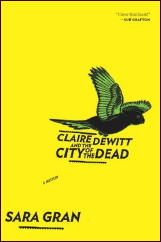Tue 8 Oct 2024
A Mystery Review by Tony Baer: SARA GRAN – Claire DeWitt and the City of the Dead.
Posted by Steve under Bibliographies, Lists & Checklists , Characters , Reviews[2] Comments
SARA GRAN – Claire DeWitt and the City of the Dead. Claire DeWitt #1. Houghton Mifflin, hardcover, June 2011. Mariner Books, trade paperback, May 2012.
So once in a long while I read something written recently. Just to make sure I’m not missing anything. Just to make sure that no one’s figured it out.

And by ‘figured it out’ I mean figured out how to write a hardboiled detective novel like they did in the good old days. I mean contemporaneously — not as a historical novel or as pastiche. In other words: I want hardboiled detectives doing their hardboiled detection right now. In this world we live in today. Not in some synthetic imagined yesteryear. Because if I wanna read yesteryear, I’ll go straight to the Hammett’s mouth. I don’t need a ventriloquist.
Anywho. So this one is written contemporaneously. So there’s that.
It takes place in New Orleans, in the aftermath of Katrina. A DA went missing in the flood. Presumed dead. Left all his considerable coin to his nephew. Who feels he owes it to his uncle to find out what happened to him. Until it begins to seem like maybe he had it coming.
What is unique and disconcerting about Claire DeWitt is that she does not depend upon traditional investigation or procedure. Rather, she depends on vibes and seeming coincidence. She does not run down the list of suspects and evaluate alibis and hard evidence. Instead, she uses a lot of hallucinatory drugs and relies on leads received in dreams. She takes her cue from a (fictional) obscure French handbook called ‘Détection’ by Jacques Silette, from which she constantly quotes.
And it’s the quotes that make this a compelling read. Not the detection. Which is hair-brained and unconvincing.
Here are some of my favorite quotes:
Be grateful for every scar life inflicts on you. Where we’re unhurt is where we are false.
There are no coincidences. Just opportunities you’re too dumb to see, doors you’ve been too blind to step through.
The truth lies — at the intersection of the forgotten and the ignored, in the neighborhood of all we have tried to forget.
He’d been counting on a happy ending. But there is no such thing. Nothing ever really ends. The fat lady never really sings her last song. She only changes costumes and goes on to the next show.
Consider the possibility that what we perceive as the future has already happened, and intuition is only a very good memory.
There will always be people who need to be rescued. And there will never, ever be enough people to save them all.
NO ONE IS INNOCENT. The only question is, how will you bear your portion of guilt?
SPOILER ALERT: The entire case is solved by a single ‘clue’. A discarded calling card randomly found near the table at the restaurant where Claire Dewitt initially meets with her client. Nearly the first thing Claire does in the book is find and pocket the random calling card.
Nearly the last thing she does is call the number. And that’s it. That’s how the mystery is solved. Calling the number on a random calling card you found during your initial client meeting at a random restaurant. If she’d called the number at the beginning of the novel, the novel would be about three pages long.
Everything that takes place between finding the card and calling the number is just one big mcguffin. Which is to say, the mcguffin is the mystery itself. END OF SPOILER ALERT.
VERDICT: Sara Gran is a really good writer. Claire Dewitt is a terrific character. Line by line, they are fresh and new. And I went out and bought a couple more Sara Gran (non-series) novels based on how good her writing is, if that tells you anything.
But the mystery itself? The detection? Strictly for the birds.
Previously reviewed here on this blog: https://mysteryfile.com/blog/?p=22628
The Claire DeWitt series —
1. Claire DeWitt and the City of the Dead (2011)
2. The Bohemian Highway (2013)
3. The Infinite Blacktop (2018)
October 9th, 2024 at 8:32 am
I bought this one way back when L. J. Roberts reviewed it for this blog, but have I read it? Not yet, but using your review as an impetus, Tony, now I can say I will!
October 11th, 2024 at 10:00 pm
I admit you have me a bit confused, because everything up to the Verdict did not seem to be heading for that particular verdict.